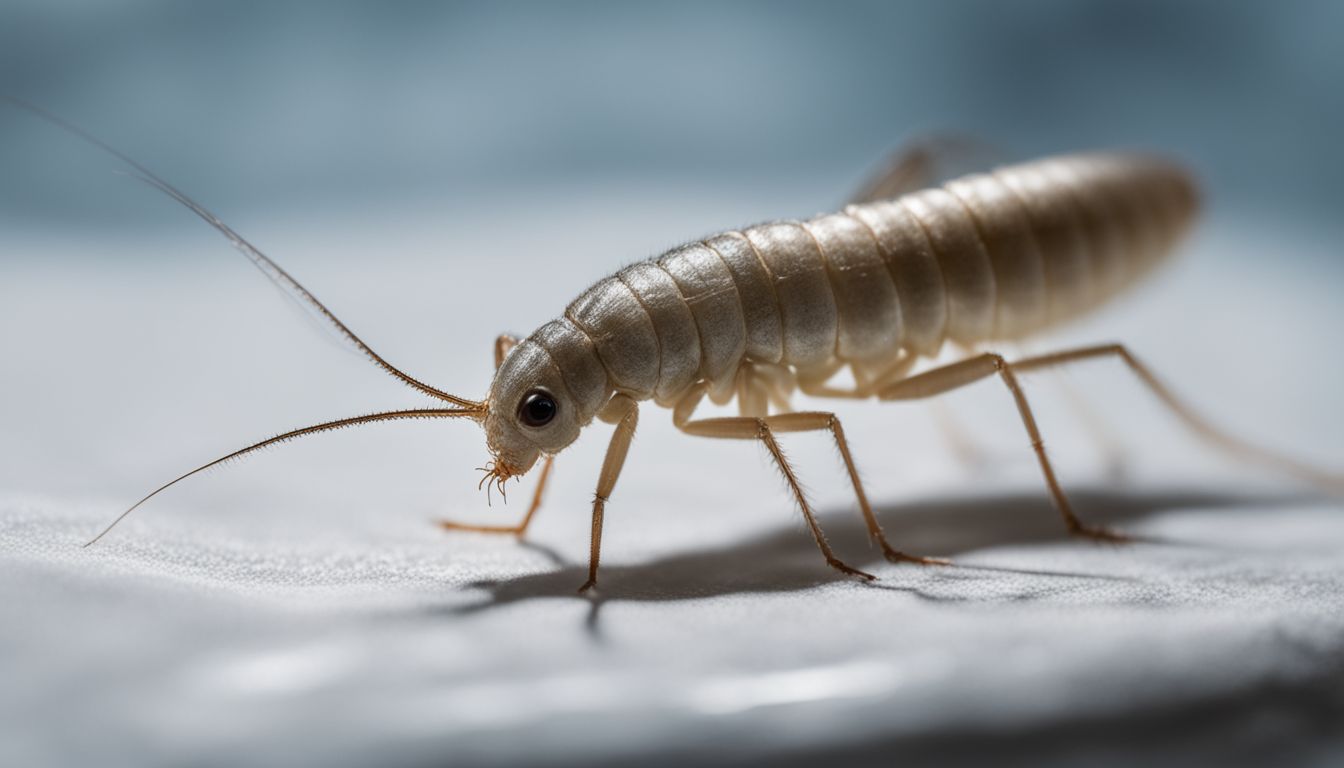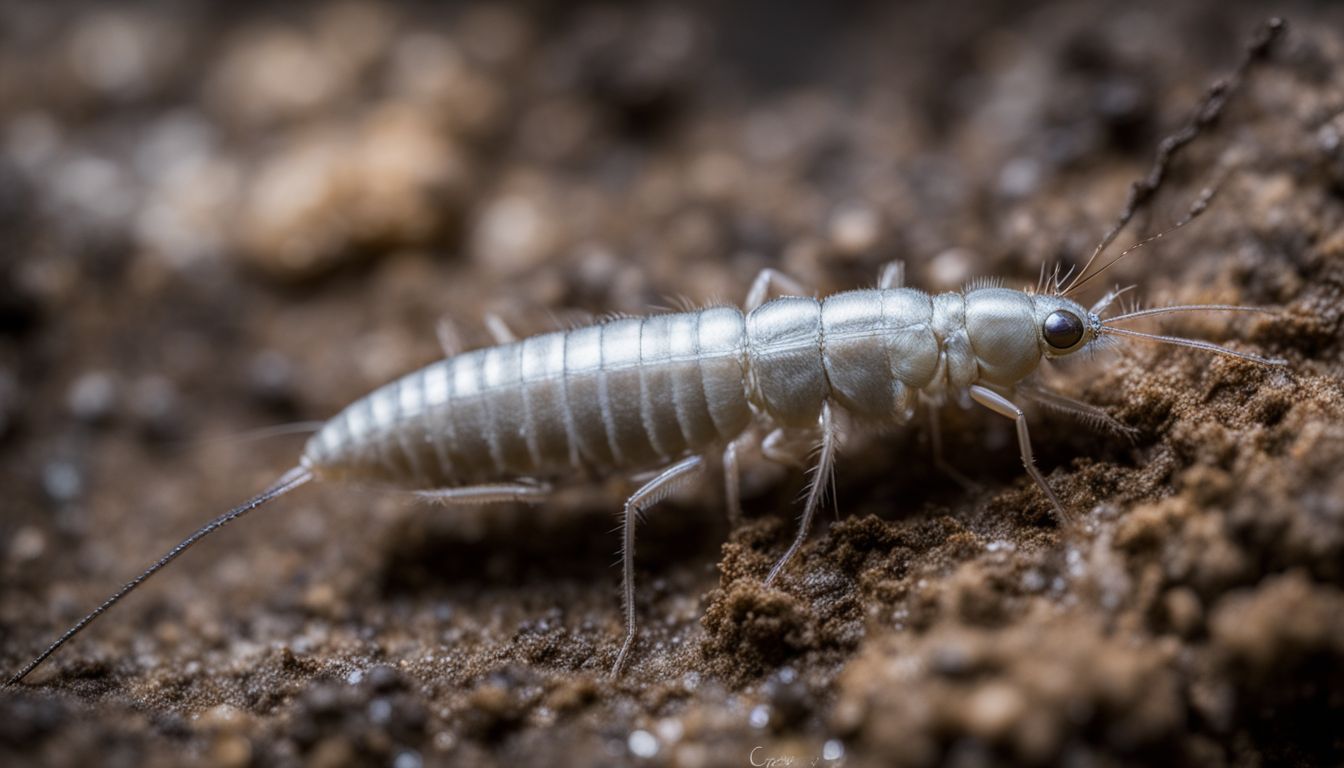“This post contains affiliate links. As an Amazon Associate, I earn from qualifying purchases”
Discovering a silverfish darting across your bathroom floor in the dead of night isn’t exactly a welcome surprise. These sneaky pests can make their homes just about anywhere, from your pantry to the pages of your favorite book, thriving unnoticed.
Why? Well, one reason is their remarkable ability to slip into the tiniest cracks and crevices, evading capture with ease.
Imagine a creature so resilient that it’s remained unchanged for millions of years—enter Lepisma saccharina, commonly known as the silverfish. In this article, we’ll dive deep into how these ancient insects have become masters of survival right under our noses.
From their uncanny fasting skills to sly nocturnal antics—we’ve got you covered on all fronts! Our guide will not only enlighten you but also arm you with effective strategies to keep these elusive tenants at bay.
Ready for some fascinating insights? Keep reading—the secret life of silverfish awaits!
The Adaptations of Silverfish

Silverfish, those elusive critters you seldom see by day, have a toolkit of adaptations tailor-made for survival. It’s this very set of skills that keeps them thriving in the secret corners of our homes—let’s delve into their world..
Shedding skin
Silverfish have a cool trick to keep growing. They can take off their old skin many times as they get bigger. This helps them fit better in their homes and move around without anyone noticing.
Their skin shedding is not just for growth, though. It also makes them slick and tricky to catch. Think of it like a fresh start every time they wriggle out of their old cover. Plus, this skill means they can slide into tiny cracks and stay safe from us trying to find them!
Nocturnalism
Silverfish are smart about staying safe. They move around at night to steer clear of enemies that might hunt them during the day. This sneaky lifestyle helps them find food without bumping into trouble.
Running across one can be a surprise since they’re so good at hiding in dark corners and only come out when it’s quiet.
They love damp spots and will hang out there until everyone else is asleep. By being active at night, silverfish keep their sly ways under wraps, making pest control more challenging for homeowners and tenants alike.
The nighttime is their playground, but these critters also know how to go a long time without a meal..
Fasting
Silverfish can live without eating for a long time. This skill helps them survive in many places, even if there isn’t much food. They are good at soaking up water from the air around them.
This means they don’t need to drink often either. Your home might be where they find the damp spots they like best.
Even when food is all gone, these bugs keep going strong. It’s impressive how they adapt to harsh living spaces, including places where we live and work. This fasting power makes silverfish tough to get rid of once they move in.
Survival Tactics of Silverfish

Silverfish are like nature’s little Houdinis—masters at the art of survival with a few tricks up their sleeves (or scales). They’ve honed some pretty clever tactics that aren’t just about outliving their peers but also about dodging our attempts to send them packing.
Ability to go without food and water
Silverfish are tough little creatures. They can live a long time without eating or drinking. This skill helps them stay alive when it’s hard to find food and water. Silverfish take in moisture from the air around them, even in dry places.
They are good at waiting until they find something to eat. Not needing much food or water makes silverfish very good at living in many homes. It also lets them hide better because they don’t have to come out as often to feed.
This means they can be around for a while before you notice them!
Sneaky behavior and fast movement
Silverfish are quick and hard to catch. They zip around fast, which makes it tough for anything trying to grab them. This helps them stay safe from things that want to eat them. At night is when they really get busy.
While we sleep, they sneak out and nibble on stuff like old books, clothes, and boxes.
These bugs love hiding spots and only come out in the dark. That’s their trick; you rarely see them during the day because they’re good at staying out of sight. When everything is quiet and it’s night-time, that’s their time to roam around your house looking for food without getting noticed.
Immunity to common bug poisons
Over time, these sneaky pests have become tough against many sprays and poisons we use. They’ve changed in ways that let them live where other bugs can’t because the chemicals don’t hurt them much.
This makes getting rid of silverfish tricky.
To keep your home silverfish-free, think about using less common methods. Try natural options like diatomaceous earth or boric acid—these substances can control them better than usual sprays.
And always remember to keep things dry; silverfish love moisture! Use a dehumidifier to cut down on humidity levels in your place.
Conclusion
Silverfish are real-life escape artists. They slip into the tiniest cracks and sprint away fast from danger. Tough little bugs, they don’t need much food or water to survive. Plus, most sprays that kill other insects don’t work on them.
This makes silverfish super survivors in our homes!
FAQs
1. Why can silverfish live in so many places?
Silverfish are tough bugs! They’ve adapted to different spots by changing their body heat and being okay with lower temperatures, making them great at finding new microhabitats to call home.
2. How do silverfish make baby silverfish without mating?
Some silverfish can have babies on their own through virgin births—that’s right, no mate needed! This process is called parthenogenesis, and it helps them make clones of themselves.
3. Can having silverfish around cause allergies?
Yes, it’s possible. Silverfish shed tiny skin flakes that can stir up allergic reactions or even asthma when people breathe them in.
4. What’s special about how silverfish survive freezing cold?
Get this—silverfish have a sort of “antifreeze” in their bodies that stops ice from hurting them during cold times! Pretty cool for little critters, huh?
5. Do all female silverfish need males to reproduce?
Not really; some female silverfish store sperm after just one meeting with a male and use it much later when they’re ready to fertilize eggs!
6. Are there any good ways to keep my home free from these pests?
Sure thing! Keeping your place dry using dehumidifiers and cleaning up food crumbs helps a bunch—plus pest experts know how to handle trickier cases if you need backup against the sneaky insects.